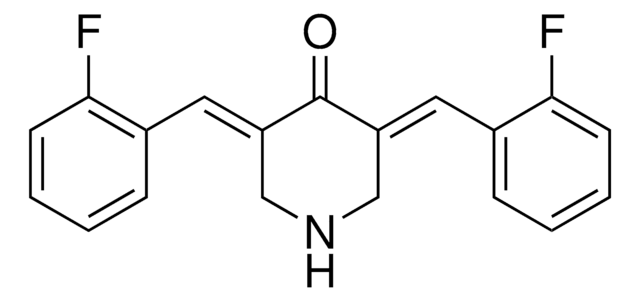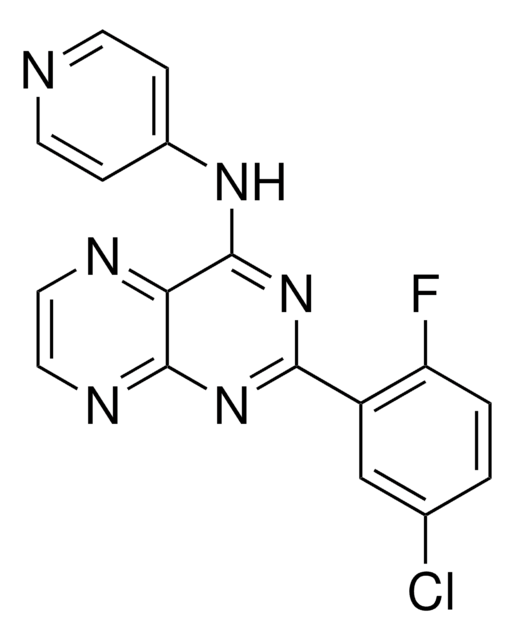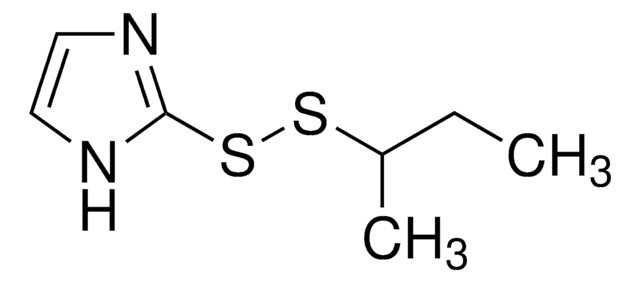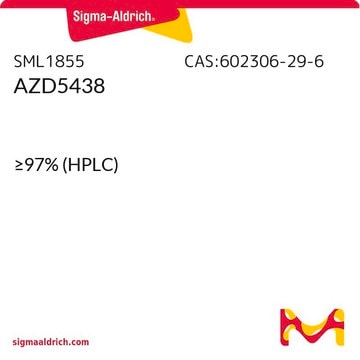SML2819
AZ12799734
≥98% (HPLC)
Synonym(s):
4-[[4-[(2,6-Dimethyl-3-pyridinyl)oxy]-2-pyridinyl]amino]benzenesulfonamide, 4-[[4-[(2,6-Dimethylpyridin-3-yl)oxy]pyridin-2-yl]amino]benzenesulfonamide, AZ 12799734, AZ-12799734
Sign Into View Organizational & Contract Pricing
All Photos(1)
About This Item
Empirical Formula (Hill Notation):
C18H18N4O3S
CAS Number:
Molecular Weight:
370.43
UNSPSC Code:
12352200
NACRES:
NA.77
Recommended Products
Quality Level
Assay
≥98% (HPLC)
form
powder
color
white to beige
solubility
DMSO: 2 mg/mL, clear
storage temp.
2-8°C
Biochem/physiol Actions
AZ12799734 is an orally active TGF-β type I receptors active site inhibitor (ALK1/2/3/4/5/6 Kd = 7.1/6.2/40/1/0.74/0.017 μM) that inhibits ALK5-dependent Smad2 nuclear translocation upon TGF-β1 stimulation (IC50 = 17 nM; MDA-MB-468), as well as ALK1/2/3/6-mediated Smad1 and ALK4/5/7-mediated Smad2 phosphorylation (10 μM; NIH3T3 expressing respective constitutively active receptors). AZ12799734 oral administration in rats results in heart valve lesions (200 mg/kg/day for 5 days) and physeal dysplasia (400 mg/kg/day for 6 days), consistent with a critical role of ALK5 in maintaining the integrity of heart valve and physis.
Storage Class Code
11 - Combustible Solids
WGK
WGK 3
Choose from one of the most recent versions:
Certificates of Analysis (COA)
Lot/Batch Number
Sorry, we don't have COAs for this product available online at this time.
If you need assistance, please contact Customer Support.
Already Own This Product?
Find documentation for the products that you have recently purchased in the Document Library.
Jason S L Yu et al.
Stem cells (Dayton, Ohio), 37(7), 958-972 (2019-04-02)
Direct in vivo reprogramming of cardiac fibroblasts into myocytes is an attractive therapeutic intervention in resolving myogenic deterioration. Current transgene-dependent approaches can restore cardiac function, but dependence on retroviral delivery and persistent retention of transgenic sequences are significant therapeutic hurdles.
Frederick W Goldberg et al.
Journal of medicinal chemistry, 52(23), 7901-7905 (2009-09-10)
A novel class of 4-pyridinoxy-2-anilinopyridine-based TGF-beta type I receptor (also known as activin-like kinase 5 or ALK5) inhibitors is reported. The binding mode of this scaffold was successfully predicted by analyzing possible docked binding modes of literature inhibitors and novel
Mark J Anderton et al.
Toxicologic pathology, 39(6), 916-924 (2011-08-24)
Aberrant signaling by transforming growth factor-β (TGF-β) and its type I (ALK5) receptor has been implicated in a number of human diseases and this pathway is considered a potential target for therapeutic intervention. Transforming growth factor-β signaling via ALK5 plays
Lindsay C Spender et al.
Molecular pharmacology, 95(2), 222-234 (2018-11-22)
The transforming growth factor β (TGFβ) superfamily includes TGFβ, activins, inhibins, and bone morphogenetic proteins (BMPs). These extracellular ligands have essential roles in normal tissue homeostasis by coordinately regulating cell proliferation, differentiation, and migration. Aberrant signaling of superfamily members, however
Our team of scientists has experience in all areas of research including Life Science, Material Science, Chemical Synthesis, Chromatography, Analytical and many others.
Contact Technical Service
